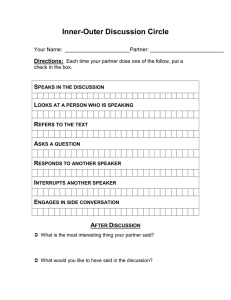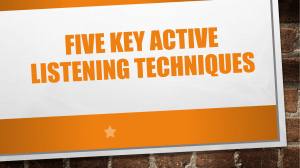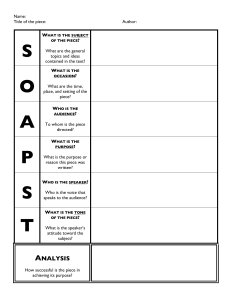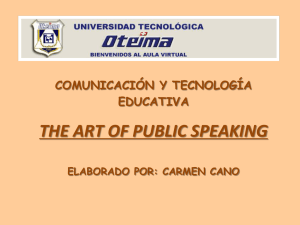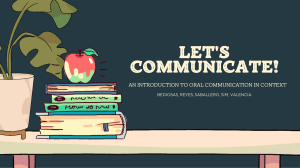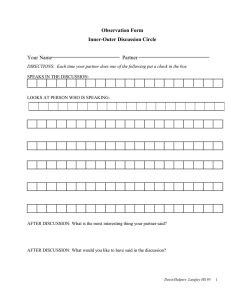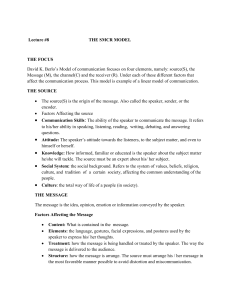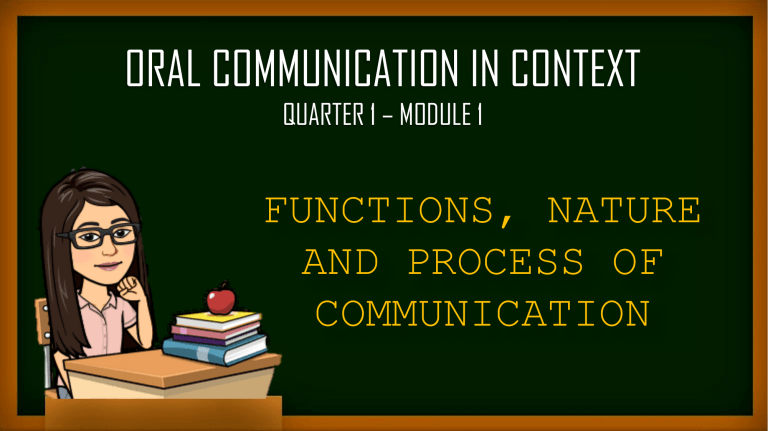
ORAL COMMUNICATION IN CONTEXT QUARTER 1 – MODULE 1 FUNCTIONS, NATURE AND PROCESS OF COMMUNICATION DID YOU KNOW THAT COMMUNICATION COMES IN VARIOUS FORMS? THOUGHT S FEELING S STRETCHING OF HANDS NODDING CONVERSATION OVER THE PHONE IDEAS EXCHANGE OF TEXT MESSAGE RAISING OF EYEBROWS BROWSING OF SOCIAL NETWORKING SITES INSIGHT WheN you… • …EXCHANGE IDEAS WITH SOMEONE • …SEND INFORMATION TO OTHERS WORDS GESTURES AND FACIAL EXPRESSIONs VARIOUS COMMUNICATION TECHNIQUES SYMBOLS SOUNDS GESTURES DRAWINGS SIGN LANGUAGES What is Communication? Why do we communicate? NATURE OF COMMUNICATION • • • Communication is a process. Communication occurs between two or more people (the speaker and the receiver). Communication can be expressed through written or spoken words, actions (nonverbal) elements OF COMMUNICATION 1. 2. 3. Speaker – the source of information or message. Message – the information, ideas, or thoughts conveyed by the speaker in Encoding – the process of conveying the message into words, actions, or understands. 4. Channel – the medium or means, such as personal or nonpersonal, verbal or nonverbal in which the encoded message is conveyed. 5. Decoding – the process of interpreting the encoded message of the speaker by the receiver. 6. Receiver – the recipient of the message, or someone who decodes the message. 7. Feedback – the reactions, responses or information provided by the receiver 8. Context – the environment where communication takes place. 9. Barrier – the factors that affect the flow of communication PROCESS OF COMMUNICATION The speaker generates idea. The speaker encodes an idea or converts the idea into words or actions. EXAMPLE Daphne loves Rico, her suitor, as a friend. She thinks of how to tell him using their native language. The speaker transmits or sends out a message. She tells him, “Rico, mahal kita bilang kaibigan.” The receiver gets the message. Rico hears what Daphne says. The receiver decodes or interprets the message based on the context. He tries to analyze what she means based on the content and their relationship, and he is heartbroken. The receiver sends or provides feedback. He frowns and does not say something, because he is in pain. FUNCTIONS OF COMMUNICATION WHY DO WE COMMUNICATE? INFORM Clarify Buy Teach Accept criticiz e INSPIRE QUESTION UNDERSTAND LEARN AFFIRM DENY COUNSEL EXPRESS CONFIRM PERSUADE CLARIFY CONCEAL SELL PROMOTE ADVISE REVEAL MOTIVATE AND MANY OTHERS COMMUNICATION SERVES MANY PURPOSES Communication comes in various forms. When you communicate, you either use words or gestures and/or facial expressions. Communication is a two-way process Communication connects people and the world they live in. Communication is a message understood. Communication is social interaction through messages. By understanding the process of communication, we can duly avoid misunderstanding and/or miscommunication. Communication serves many purposes. ACTIVITY 1. WHAT’S MORE Think of communication transactions in your daily life. Enumerate situations where communication takes place. Then, indicate the result of the communication transaction and tell whether it is successful or not by writing the elements that made it so and specify its function on the third column. An example is provided for you. Use a separate sheet of paper to answer this. Situation When I was 12, my father told me that I am in-charge of cooking rice for lunch everyday whenever I am available. One time, I forgot to cook rice because I got busy on my assignment. As a result we did not have rice to eat. My father reminded me about the task assigned to me. 1. (Teacher-Student Conversation) 2. (Buyer-Seller Conversation) 3. (Doctor-Patient Conversation) Result of the Communication Transaction Function of Communication Message was clear that I need to perform my task. At first the communication was successful. I thought other family members will do my task because I am doing other To inform things. My fault there was I failed to clarify communicate to them that I am busy doing my assignment. Should I have communicated this earlier, we would have rice to eat. and to What I can do Create a comic strip showing how you would activity 1. comic communicate to your community the advantages of following health protocols and guidelines amidst strip covid-19 pandemic in your municipality or province. You may cut-out pictures of people or authorities to depict your character, but be sure to write your own original scripts and texts. ACTIVITY 2. what have I Based on the discussion, fill–in learned the following kwlh chart to track (K) (w) (l) your learning status in (H) this What do I What What did how did LESSON. know concepts I learn I learn before the start of the discussio n? Nature of communication or ideas do I want to know more? from this lesson? it? Cite samples and situatio ns

